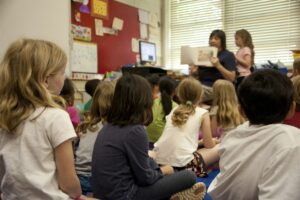Inclusive and Safe School Climates: School Climate in One of New York’s Safest Schools (Part 2)
By David Hurst, Ph.D, Deputy Superintendent of Bethlehem Central School District
This is Part 2 of our blog series (see Part 1 here) on the importance of inclusive and safe school climates. In this blog, Dr. David Hurst, Deputy Superintendent of Bethlehem Central School District, discusses the practices and programs which have contributed to a positive school climate at Bethlehem.
School Climate in One of New York’s Safest Schools
Student safety and well-being are top priorities, however, our district is always looking at ways to improve. At Bethlehem, we are using a holistic combination of building safety strategies and a mission-driven, people-centered approach to ensure our school community is both safe and nurturing. All of our strategies and techniques center on the district’s four core values of academics, character, community, and wellness. They include the following:
Building Safety
Bethlehem, like all school districts in New York State, has both a comprehensive district safety plan and building-level safety plans for each of its schools. All buildings use one secure point of entry during the school day. Capital investments have improved building security with additional technology and a robust interior and exterior camera system that is used daily.

The district partners with the Bethlehem Police Department and other community partners in developing the safety plans, which are reviewed and updated annually. Staff are trained on how to respond in the event of an emergency and drills are practiced throughout the school year. Teachers at all levels (K-5, 6-8, and 9-12) are trained to use developmentally appropriate language and instructions with their students.
After each drill, and several times throughout the year, we reach out to families directly to remind parents and guardians about the safety drills and procedures we use. We encourage families to review these safety procedures together with their children. Large-sized posters that describe these procedures are posted in all schools and are designed to convey the importance of preparedness in a non-threatening manner.
Student Support Services
Our Student Support Services team provides comprehensive counseling services to our students that emphasize mental health and wellness. Over the last several years, these services have been expanded to include all of our buildings, K-12. We currently have several prevention and intervention services in our schools that support the behavioral and social-emotional and mental health of students which may include psychological, social and educational support. We have also added a partnership with the Saratoga Center for the Family so that district families who may be struggling to support the needs of their children can access services outside of school.
Students as Involved Peer Leaders
The district provides several platforms for students to participate in decision-making processes and contribute to a positive school culture. At the elementary level, this often takes place within the classroom. Once in middle school, students are encouraged to become involved in student government such as Student Council, and club activities that promote a positive school climate such as the Helping Hands Club and Students Against Destructive Decisions (SADD).
At the high school, students have even more opportunities to become peer leaders. There is a robust student government, known as Student Senate, representing students in all grades 9-12. Over the last three years, Student Senate representatives and other student leaders at BC have been taking part in regional conversations with students from other districts via a program known as Elevating Student Voices, where students can engage in open dialogue about their diverse life experiences in their schools and communities and take a deeper dive into issues that are important to them.
This year, the district has partnered with the National Coalition Building Institute (NCBI) to train two dozen Bethlehem high school students with skills to encourage respect and teamwork among all students, and staff, and expand understanding and appreciation of the diversity within their school community.
Promoting Positive Behaviors
Character education is integrated into the curriculum to foster values such as respect, responsibility, fairness, and empathy.
Positive behavior is recognized and celebrated throughout grades K-12. Elementary schools may have weekly recognition programs such as the Glenmont Gold Awards. At the middle school, each quarter, students are selected by teachers and staff for character awards. At the high school, a similar character awards program is known Be the Change Awards, recognizing students who are role models among their peers. This year, faculty and staff are also being awarded “Be the Change Awards.”
Communication is key to an engaged school community.
The district is always striving to foster more positive relationships with students, staff, families, and the community at large. One of the ways the district is doing this is with a phone-free environment for K-12. This year, the high school has gone phone-free by requiring students to keep their cell phones in a locked pouch called a Yondr pouch. Students put their phones in their Yondr pouch and lock it in the morning. They keep the phone and pouch in their possession, but it is not unlocked until the end of the day. This has been a successful endeavor. Staff and students alike are reporting greater focus in classrooms and more interpersonal connection and communication throughout the school day.
The district implemented a new communications tool called ParentSquare to integrate classroom, building-level, and district-level communications. ParentSquare helps us to keep everyone informed about safety measures, policies, and any updates related to the school environment.
The district continually asks for feedback from all stakeholders through an annual School Climate Survey. The survey results and those from our student PASS (Pupil Attitudes to School and Self) help us continue to refine our strategies to ensure student safety and a positive school climate.
Thank you for your interest in NYKids! Please reach out to us at nykids@albany.edu with any questions or feedback. We encourage you to follow us on X, Instagram, Facebook, and LinkedIn.
